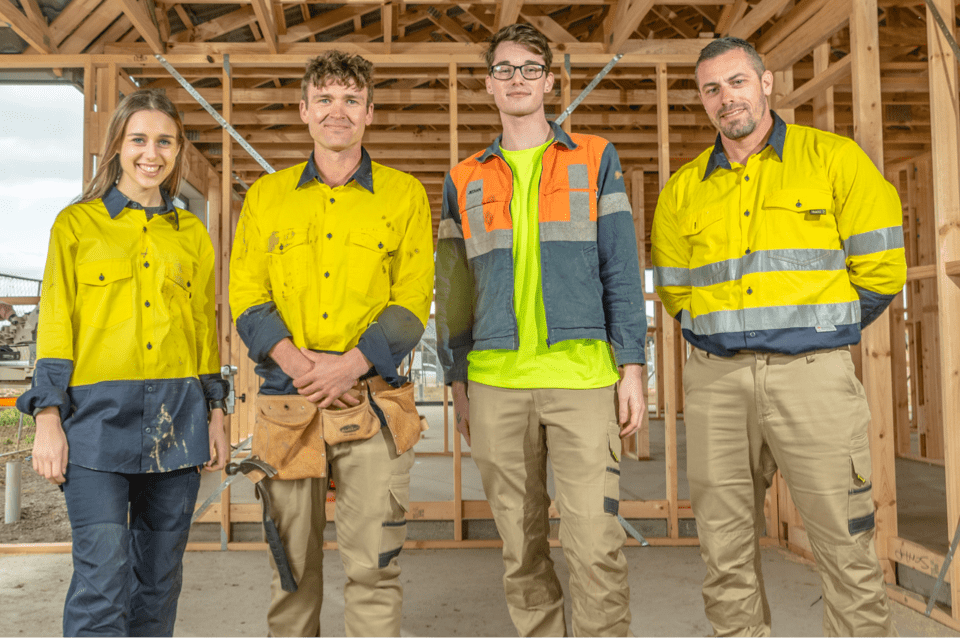Carpentry is a great line of work to get into because it’s so versatile and flexible. There’s always room for carpenter career progression!
In this blog, we’ll discuss some of the top alternative careers for carpenters.
1. Become a supervisor or manager
Once you’re trained and qualified as a carpenter, you can upskill to get off the tools. If you’re done with working with your hands, then this might be the right option for you.
As a site supervisor, your day to day would involve supervising building projects, coordinating the trades, checking their work and organising supplies.
As a construction manager, you’d be a level higher than a supervisor. You’d do things like hire and supervise workers and subcontractors, manage costs and report to clients.

2. Start your own business
Starting your own carpentry business can be very rewarding. If you’re a “self-starter”, then this could be the career path for you.
Here are some benefits to starting your own business:
- Become your own boss
- Work on the types of projects you want to work on
- Follow your own schedule
3. Change industries
If you’re already working as a carpenter but it’s just not doing it for you, then maybe a side-step into a new industry is what you need.
Here are three carpenter industries you could shift into for a change of scenery.
Commercial Carpentry
In this industry, you’d do building projects like hotels, office towers, schools, restaurants and retail developments.
You’d branch out from traditional materials like wood to work with steel, plastic and plaster. You might even work more with new technologies such as VR, which is becoming a feature of commercial building.
Industrial carpentry
This would involve building power plants, factories, mining infrastructure or bridges and tunnels.
As an industrial carpenter, you’d do things like build scaffolding, bracing and partitions, and pour concrete forms. You might work with civil engineers.
Residential carpenter
In this line of work, you’d build dwellings like detached houses, townhouses or units.
You’d spend your day to day framing interior and exterior walls, or building staircases, decks and roofs.

4. Specialise
Aside from industries, specialising is another way to look for alternative careers for carpenters.
If you know which industry you like and which one you’d be the best at, then you could choose to narrow the type of carpentry that you’re doing.
For example, within residential carpentry, you could specialise to work on details like cabinets, floors or crown moulding.
If you prefer commercial carpentry, you could specialise in installing panels, windows or ceilings.
Here are some other specialties:
- Fixing Carpenter
Also known as 2nd fixing carpenter. Hangs doors, architraves and skirtings. - Formwork Carpenter
Constructs the moulds that retain wet concrete of foundations and other concrete structures. Normally works in large scale construction or civil projects. - Prop and Scenery Maker
Builds the sets, backdrops, furniture and props for film, TV, theatre or exhibitions and events.
Getting started: alternative careers for carpenters
For carpenter career progression, you’ll probably need to upskill in building and construction courses.
By completing building training, you’ll be able to get better, higher paying jobs that give you more satisfaction… and of course, room for growth.
Here are a few courses that lead to in-demand careers.
CPC40110 Certificate IV in Building and Construction (Building)
This qualification gives you the skills and knowledge to supervise or manage small to medium-rise residential projects.
CPC50210 Diploma of Building and Construction (Building)
Trains you in the skills you need to manage or supervise residential, industrial or commercial building projects up to three storeys high.
Studying a cert IV or a diploma online lets you continue working in your day job while you upskill at your own pace.

Next steps
Now that you know more about alternative careers for carpenters, it’s time to think about the next step in your career.
Whether you want to supervise, start your own business, change industries or specialise, carpenter career progression can give you the ultimate job satisfaction.
By doing one of our building and construction courses, you can gain the skills you need to succeed and improve your chances of getting the jobs you want.
Need advice on your career progression? Contact our team at 1300 4 CWBTS or request a call back today.





